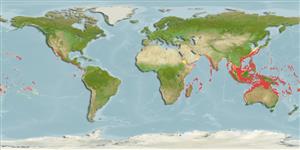Teleostei (teleosts) >
Acanthuriformes (Surgeonfishes) >
Acanthuridae (Surgeonfishes, tangs, unicornfishes) > Acanthurinae
Etymology: Acanthurus: Greek, akantha = thorn + Greek, oura = tail (Ref. 45335); xanthopterus: Name from Greek 'xanthos' for yellow and 'ptero' for fin; referring to the yellow color of the outer part of the pectoral fin (Ref. 37792).
More on author: Valenciennes.
Environment: milieu / climate zone / depth range / distribution range
Ecology
Marine; reef-associated; depth range 1 - 100 m (Ref. 9267), usually 5 - 90 m (Ref. 27115). Tropical; 24°C - 28°C (Ref. 27115); 35°N - 35°S, 23°E - 77°W
Indo-Pacific: coast of East Africa to the Hawaiian Islands and French Polynesia, north to southern Japan, south to the Great Barrier Reef and New Caledonia. Eastern Pacific: lower Gulf of California and Clipperton Island to Panama and the Galapagos Islands.
Size / Weight / Age
Maturity: Lm ? range ? - ? cm
Max length : 70.0 cm TL male/unsexed; (Ref. 4795); common length : 50.0 cm TL male/unsexed; (Ref. 30573); max. reported age: 34 years (Ref. 52229)
Dorsal spines (total): 8 - 9; Dorsal soft rays (total): 25 - 27; Anal spines: 3; Anal soft rays: 23 - 25. Body purplish gray when alive; grayish brown when preserved; a region of dull yellow in front of eye, a lesser extension posterior to lower part of eye; outer 1/3 of pectoral fin yellow, extreme distal part hyaline; dorsal and anal fins yellowish grey basally, dull yellow distally; caudal fin base whitish; caudal fin purplish. Anterior gill rakers 16-24, posterior 17-22. Caudal spine small.
Live in various reef habitats, sand slopes and lagoons (Ref. 48637). Juveniles inhabit shallow, protected, turbid inshore waters while adults prefer deeper areas of protected bays and lagoons. Also in outer reef areas (Ref. 1602). Benthopelagic (Ref. 58302). Schooling species, feed on diatoms, detritus film of sand, filamentous algae, hydroids, and pieces of fish (Ref. 1602, 48637). Probably the only surgeonfish that readily takes bait (Ref. 12484).
Life cycle and mating behavior
Maturity | Reproduction | Spawning | Eggs | Fecundity | Larvae
Randall, J.E., 1956. A revision of the surgeonfish genus Acanthurus. Pac. Sci. 10(2):159-235. (Ref. 1920)
IUCN Red List Status (Ref. 130435: Version 2024-1)
Human uses
Fisheries: minor commercial; aquarium: commercial
Tools
Special reports
Download XML
Internet sources
Estimates based on models
Preferred temperature (Ref.
123201): 23.3 - 29, mean 27.7 °C (based on 2980 cells).
Phylogenetic diversity index (Ref.
82804): PD
50 = 0.5000 [Uniqueness, from 0.5 = low to 2.0 = high].
Bayesian length-weight: a=0.02455 (0.02112 - 0.02853), b=2.95 (2.91 - 2.99), in cm total length, based on LWR estimates for this species (Ref.
93245).
Trophic level (Ref.
69278): 2.9 ±0.23 se; based on food items.
Generation time: 3.8 ( na - na) years. Estimated as median ln(3)/K based on 1
growth studies.
Resilience (Ref.
120179): Very Low, minimum population doubling time more than 14 years (K=0.287; tmax=34).
Fishing Vulnerability (Ref.
59153): Moderate vulnerability (37 of 100).
Nutrients (Ref.
124155): Calcium = 33.2 [15.3, 112.0] mg/100g; Iron = 0.603 [0.209, 1.707] mg/100g; Protein = 19 [18, 20] %; Omega3 = 0.143 [0.065, 0.314] g/100g; Selenium = 22.5 [7.9, 74.1] μg/100g; VitaminA = 46.5 [18.2, 115.5] μg/100g; Zinc = 2.15 [0.68, 3.89] mg/100g (wet weight);
